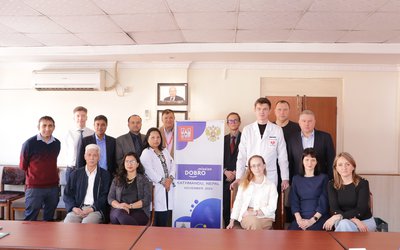
The World Health Organization (WHO) has announced it will establish a hub for pandemic and epidemic intelligence in Berlin later this year to analyze information on emerging pandemic threats.
The hub will be a global center that works with partners around the world to lead innovations in pandemic and epidemic intelligence, data, surveillance and analytics, WHO General Director-General Tedros Adhanom Ghebreyesus said at a virtual event, also attended by German Chancellor Angela Merkel and Health Minister Jens Spahn, on Wednesday.
The hub is set to analyze data quickly and in detail in order to predict, prevent, detect, prepare for and respond to risks worldwide, according to the WHO.
It will try to get ahead of the game, looking for pre-signals that go far beyond current systems that monitor publicly available information for signs of emerging outbreaks.
"The COVID-19 pandemic has exposed gaps in the global systems for pandemic and epidemic intelligence," Tedros told journalists.
"There will be more viruses that will emerge with the potential for sparking epidemics or pandemics ... Viruses move fast. But data can move even faster. With the right information, countries and communities can stay one step ahead of an emerging risk and save lives," he said.
"There are signals that may occur before epidemics happen... data that can give us pre-signals," said WHO emergencies director Michael Ryan. That information could drive early decision-making, he added.
"The hub will allow us to develop tools for that sort of predictive analytics," he said.
Why Berlin?
Merkel said Berlin is a good location for the hub as it already had leading players in the digital and health fields, such as the Robert Koch Institute.
"If that expertise is now supplemented by the WHO hub, we will create a unique environment for pandemic and health research here in Berlin – an environment from which important action-oriented insights will emerge for governments and leaders around the world," she said in a video message.
It is hoped that the site will be operational from September. Its budget is still under discussion, while Germany will meet the start-up costs.
Spahn said the world needed the capacity to detect outbreaks with the potential to become health crises "before the threat becomes a sad reality."
Global systems were currently "insufficiently prepared" to handle the risks posed by outbreaks, mutations of existing pathogens, extensions of diseases to previously unaffected populations, and diseases jumping species from animals to humans, he added.
"There's a clear need for a stronger global early warning alert and emergency response system with improved public health intelligence," he said, adding that better data and better analytics are key for better decisions.
- New Anti-aircraft Missile Test-launched On Friday
- Apr 20, 2024
- India Begins 'World's Largest General Election'
- Apr 19, 2024
- Finance Minister Pun World Bank For More Investment In Nepal
- Apr 18, 2024
- Everest Climbing Route Will Be Open Soon For Coming Session
- Apr 18, 2024
- India Is Set To Begin Six Week Long General Elections From Friday
- Apr 18, 2024
















